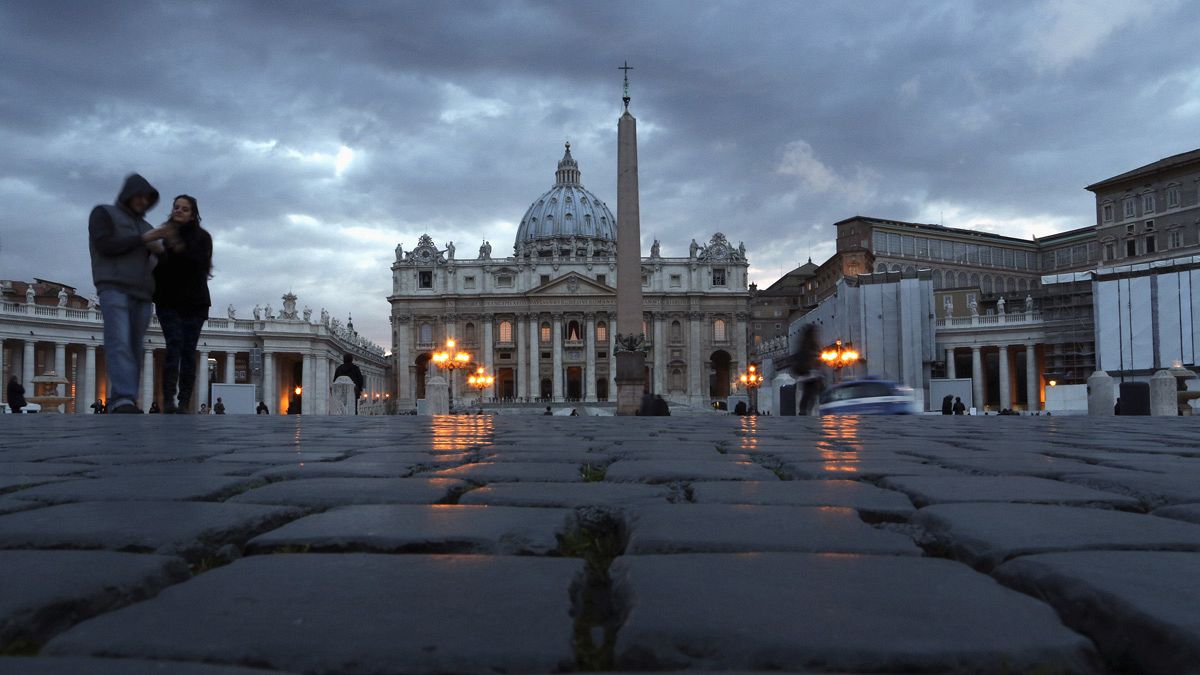Who will the 115 cardinals choose, once the conclave convenes, to replace the man who has bowed out after eight years in the Catholic Church’s hot seat?
Two rival camps are reported to have developed, suggesting a power struggle within the church’s hierarchy.
Perhaps too simplistically, the election of Benedict’s successor has been described as a battle between traditionalists and reformers.
The Vatican insists cardinals will be able to vote according to their conscience.
As he bade farewell to the cardinals, many of whom he had chosen, Benedict made his neutrality clear – whatever the outcome.
“May the Lord guide you,” he told them. “Among you is also the new pope to whom I today declare my unconditional reverence and obedience.”
There is too much uncertainty – and secrecy, despite leaks and the prying eyes of the world’s media – to talk of clear favourites.
But among several names who have been mentioned as strong contenders, Brazil’s Odilo Scherer, the Archbishop of Sao Paolo, has repeatedly cropped up.
The 63-year-old multi-linguist is seen as having close ties to the Curia, the Catholic Church’s governing body.
Old-fashioned he is not, at least in terms of technology. When he opened his Twitter account, he said if Jesus preached the Gospel today, he would use it too.
But while Scherer is seen as being in tune with the times, the ‘reformist’ tag is pinned to another candidate seen as a frontrunner.
Angelo Scola was appointed Archbishop of Milan in June 2011 by Pope Benedict. He is 72, seen as a conservative, theologically close to the outgoing pontiff and to John Paul II before him.
He is said to be favoured by a group led by American cardinals who want to see the Curia’s influence reined in, especially in the wake of the ‘Vatileaks’ scandal and reports of infighting.
But previous conclaves have produced surprises and several other names have also emerged as potential popes.
Many different factors are coming into play in the choice of Benedict’s successor.
Should the new leader be from outside Europe? A pastoral pope with charisma, or a good manager who can continue to tackle the church’s problems and scandals head-on?
The new man will need many attributes. He is unlikely to please everyone.
So, what are the different scenarios for the papal conclave? To try to answer that question, euronews spoke with journalist Giacomo Galeazzi, who covers the Vatican for Italian newspaper La Stampa.
euronews: “Mr Galeazzi, who are the cardinals and what are the tendencies that could determine the choice made by the next Conclave?”
Giacomo Galeazzi: “The congregations are beginning to focus on two names: Scola, the Archbishop of Milan, and Scherer, the Archbishop of Sao Paolo in Brazil, who is also the commissioner at the Vatican for the IOR, the Vatican bank. During the first votes for these names there could be a kind of confrontation between members of the Curia (the Vatican government) and the cardinals outside of the Curia who have been very critical of the management of the Vatileaks scandal in the general congregations.’
euronews: “Are there any favourites in this Conclave?”
Giacomo Galeazzi: “At the moment there is a leaning towards the first ever non-European pope. Vatileaks and the financial scandals within the Vatican have had a very harmful effect on the Curia and the Italian Cardinals. This has weakened the possibility of a return to an Italian pope after two foreign pontificates. So, for now, the strongest candidate with the support of Bertone Piacenza – the Vatican Secretary of State – seems to be the Brazilian cardinal, Scherer, who combines his pastoral activity of bishop in Sao Paolo with that of a man who, as a member of the Vigilance Commission of the IOR, is capable of managing the Vatican bank.’
euronews: “In February 2012, Benedict XVI named 22 cardinals, most of them Italians. In November, he chose six non-European cardinals, almost as a way of balancing the Conclave. Do you think the next pontificate will continue in the same way?”
Giacomo Galeazzi: “I think that the ‘Ratzingerian purification’ will be a programme of government which won’t be able to not be so. The next pope will inherit from Benedict XVI the management of the fight against sexual abuse within the Church, and the clean up following the financial scandals. We mustn’t forget that Benedict XVI is the pope who called for the resignation of about 80 bishops for not having prevented the sexual abuse of priests and had re-established in the Vatican the authority to disclose financial information to bring to light and watch over the holy finances.”
euronews: “In Italy it is said that ‘he who comes into the Conclave as a pope leaves as a Cardinal’, meaning that those who are too much of a favourite at the beginning risk not achieving that at the time of the vote. Is there any truth in that?”
Giacomo Galeazzi: “It’s a fair way of looking at things. The general congregations which have characterised this pre-Conclave phase have shown that the cardinals, especially those from the Southern Hemisphere, want to be protagonists in a demand for clarification and they want the Roman Curia to be reformed in a way that Benedict XVI wasn’t allowed to do.
“It will be a significant point if the next pope is not only “Ratzingerian” because he was named by Ratzinger but also because of his will to continue the “cleaning up” operation started by Benedict XVI and to follow his fight against the scandals within the Church. So all those cardinals who have been caught up in the Vatileaks scandal will be out of the running. Apparently a sort of tsunami of non-European candidates will fall upon the Roman Curia, and this could take the pontificate far away from Rome, making it more international.”
